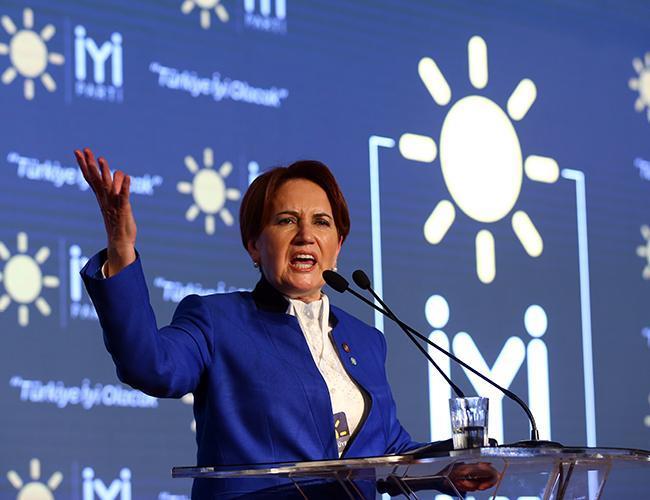Akşener hints at run for presidency in 2019 as she forms ‘Good Party’
ANKARA

Meral Akşener, an experienced right-wing politician and former interior minister, formed her long-anticipated political party under the title of the “Good Party” on Oct. 25, hinting at a run for Turkey’s presidency against President Recep Tayyip Erdoğan in 2019.
Akşener submitted a petition for the formation of the Good Party to the Interior Ministry earlier in the day before she held her first meeting with the founders and sympathizers of the new party.
“Turkey will be good,” Akşener said in her first address to her followers, referring to the name of the party. “Turkey and its people are tired. The state has corroded. Public order has dissolved. There is no other way but to change the entire political climate,” she added.
Akşener and some other deputies were expelled from the Nationalist Movement Party (MHP) amid disagreements with MHP Chair Devlet Bahçeli, who has sided with President Erdoğan on key issues in recent months, including the shift to an executive presidential system.
In 2016 initiatives by Akşener-led dissidents to hold an extraordinary convention within the MHP to challenge Bahçeli were nixed in controversial court decisions, pushing the veteran politician to form her own party. Four MHP lawmakers and one Republican People’s Party (CHP) lawmaker joined the Good Party on its first day, securing five seats for Akşener in the parliament.
Although the Good Party includes figures who have come from an MHP background, Akşener’s Good Party aims to target center-right, nationalist and democratic voters through a party program appealing to different political perspectives.
‘They want me as president’
Akşener’s first meeting took place at the Nazım Hikmet Cultural Center that belongs to the CHP’s Yenimahalle Municipality in Ankara, as a number of major hotels and convention centers refused to rent their halls to the Good Party.
Her speech was interrupted by chants from participants calling her “Prime Minister Meral,” to which she responded by hinting at a presidential run.
“No, no. Not prime minister but president. All my friends and founders at the party insist I should become the president,” said Akşener, signalling her potential nomination for the presidential election due to take place in late 2019.
Democracy under threat
“It’s time to say new things. Yes, we have major problems. But Turkey has enough powers to resolve them. We have hopes and dreams. We want a prosperous and just Turkey. We want a free society. We want a happy Turkey,” said Akşener.
“Good is justice, good is determination. Good is hope, good is future, knowledge. Good is richness, courage. Good means civilization and only the brave will pave this road,” she added, describing Turkish democracy as “under threat.”
Education, justice, economy
Akşener said the Good Party’s priority will be to make Turkey one of largest economies in the world, as she instructed her economy team to maintain no less than six percent annual growth when they are in power.
Increasing the quality of education, providing full-scale health services to everyone and fixing the problems of the judiciary have also been cited by Akşener as her priorities.
“Politically driven court decisions are even more dangerous than the enemy’s bullets. We will not allow politics to take control of the justice system,” she said.
Fight against FETÖ to continue
Akşener also referred to the ongoing fight against the Fethullahist Terror Organization (FETÖ), describing the July 15 coup attempt as a “most treacherous move” against the Turkish people and the state.
“FETÖ, this treacherous gang, has been the main actor of each and every operation [against Turkey] not only since July 15, but since 2004 ... The people saved the state in the streets,” she said, indirectly criticizing the Justice and Development Party’s (AKP) alliance with the group in the past.
‘Media should not be under pressure’
Touching on Turkey’s democratic problems, Akşener emphasized the importance of a “functioning, competitive political system.”
“Media should not be under pressure. Democratic participation, a strong parliament and the national will are irreplaceable. We will democratize the law on political parties in the light of contemporary democratic principles and the criteria of the Venice Commission,” she said.
She also suggested decreasing the national threshold applied for parliamentary elections to five percent from the current 10 percent.
















